Workshop Agenda | Presenters | Links for Software and Programs
Agenda
| January 12 | Computational Support | |
|---|---|---|
| Time (US Central) | Presenters | Topic |
| 10:00 – 11:00 | Endelman Coordinator Filipe Inacio Matias Jeekin Lau Maria Caraza-Harter Gabriel Gasteira |
Office Hours Assist with software installation and basic troubleshooting #R Slack channel for more support |
| January 13 | Introduction and Welcome | |
| Time (US Central) | Presenters | Topic |
| 10:00 | Byrne | Introduction (Slides) | Introduction (Recorded Presentation) |
| Main | Community Website Resource | |
| Genotype calls | ||
| 10:45 | Voorrips | Overview on genotype calling |
| 11:15 | Mollinari | SuperMASSA |
| 12:15 | Clark | polyRAD |
| 1:15 | Voorrips | fitPoly |
| 2:15-2:45 | All | Q&A |
| January 14 | Linkage maps and Haplotype reconstruction | |
| Time (US Central) | Presenter | Topic |
| 10:00 | Mollinari | Overview |
| 10:45 | Bourke | polymapR |
| 12:15 | Mollinari | MAPpoly |
| 1:45 | Zheng and Endelman | PolyOrigin |
| 2:45 – 3:15 | All | Q&A |
| January 15 | QTL analysis | |
| Time (US Central) | Presenter | Topic |
| 10:00 | Maliepaard | Overview |
| 10:45 | Bourke | polyqtlR |
| 11:45 | Pereira | QTLpoly |
| 12:45 | Endelman | diaQTL |
| 1:45 | Endelman | GWASpoly |
| 2:45 – 3:15 | All | Q&A |
Presenter Information
 Dr. David Byrne (PD), the Basye Endowed Chair in Rose Genetics, and a Professor in Horticultural Sciences at Texas A&M University. He works internationally in Prunus and Rosa breeding and genetics. He led the SCRI Combating Rose Rosette Disease project, worked with the SCRI RosBREED 2 project, and currently chairs the National Clean Plant Network for Roses. He routinely works with numerous scientists, private breeding programs, ornamental nurseries, marketers, and producers as well as ornamental hobbyist groups. He has, in collaboration with Dr. Klein, developed a GBS pipeline for Rosa, created high density rose maps, and is working with Dr. Riera-Lizarazu to incorporate genomic approaches (MAB, GWAS, GS) into the rose breeding program to enhance disease resistance (RRD, black spot, cercospora), flower productivity, and horticultural quality of roses. Over the past decade, he has mentored 18 graduate students, published 37 refereed and 27 non refereed publications, has given about 140 talks, and released 23 Prunus and 6 Rosa cultivars. He reaches out to the rose community via Facebook and with Rose Updates. He is the Project Director and will coordinate the training aspects of the project and work with Drs. Riera-Lizarazu and Klein on the validation of the computational tools on multiple rose datasets. He will discuss the unique challenges of the polyploid crop breeding community and summarize survey results on the status of genomics-assisted breeding among our community.
Dr. David Byrne (PD), the Basye Endowed Chair in Rose Genetics, and a Professor in Horticultural Sciences at Texas A&M University. He works internationally in Prunus and Rosa breeding and genetics. He led the SCRI Combating Rose Rosette Disease project, worked with the SCRI RosBREED 2 project, and currently chairs the National Clean Plant Network for Roses. He routinely works with numerous scientists, private breeding programs, ornamental nurseries, marketers, and producers as well as ornamental hobbyist groups. He has, in collaboration with Dr. Klein, developed a GBS pipeline for Rosa, created high density rose maps, and is working with Dr. Riera-Lizarazu to incorporate genomic approaches (MAB, GWAS, GS) into the rose breeding program to enhance disease resistance (RRD, black spot, cercospora), flower productivity, and horticultural quality of roses. Over the past decade, he has mentored 18 graduate students, published 37 refereed and 27 non refereed publications, has given about 140 talks, and released 23 Prunus and 6 Rosa cultivars. He reaches out to the rose community via Facebook and with Rose Updates. He is the Project Director and will coordinate the training aspects of the project and work with Drs. Riera-Lizarazu and Klein on the validation of the computational tools on multiple rose datasets. He will discuss the unique challenges of the polyploid crop breeding community and summarize survey results on the status of genomics-assisted breeding among our community.
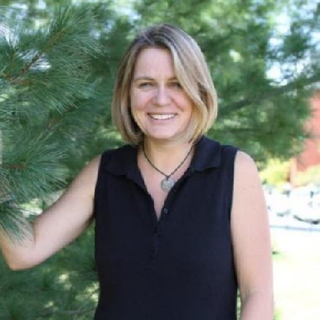 Dr. Dorrie Main is a Professor of Bioinformatics in the Department of Horticulture at Washington State University. She runs a highly collaborative, multi-disciplinary research program that has been funded through public (NSF, USDA) and industry (cotton, tree fruit, and legume) sources. The research develops database resources for specific crops (e.g., Genome Database for Rosaceae, CottonGen, Citrus Genome Database, Cool Season Food Legume Database, Genome Database for Vaccinium), online computational tools (e.g. GenSAS), sequence analysis pipelines (e.g. RefTrans), and generic database platforms (e.g. Tripal). The lab also identifies genomic regions and markers controlling important traits and studies genome evolution (e.g. synteny analysis in horticultural crops). All of these efforts seek to provide genomic, genetic, and breeding resources to enable basic, translational, and applied research. They are active members of the AgBioData Consortium and host the AgBioData website.
Dr. Dorrie Main is a Professor of Bioinformatics in the Department of Horticulture at Washington State University. She runs a highly collaborative, multi-disciplinary research program that has been funded through public (NSF, USDA) and industry (cotton, tree fruit, and legume) sources. The research develops database resources for specific crops (e.g., Genome Database for Rosaceae, CottonGen, Citrus Genome Database, Cool Season Food Legume Database, Genome Database for Vaccinium), online computational tools (e.g. GenSAS), sequence analysis pipelines (e.g. RefTrans), and generic database platforms (e.g. Tripal). The lab also identifies genomic regions and markers controlling important traits and studies genome evolution (e.g. synteny analysis in horticultural crops). All of these efforts seek to provide genomic, genetic, and breeding resources to enable basic, translational, and applied research. They are active members of the AgBioData Consortium and host the AgBioData website.
Presenter Information: Computational Tools
 Dr. Roeland Voorrips is a senior researcher at Wageningen Research – Plant Breeding. After his study Plant Breeding at Wageningen University he was employed at a vegetable seed company before joining Wageningen Research in 1986. He has studied disease and pest resistance in many vegetable crops, and he has been working on quantitative and population genetics methods, including linkage and QTL mapping. Since 2010, he became involved in the development of genetic tools for polyploid crops. He has published several genetics software packages, including MapChart, Pedimap, PediHaplotyper, fitTetra / fitPoly and PedigreeSim, and contributed to others including joinmap and polymapR. In his introduction to the dosage calling workshop, he will introduce some basic genetic concepts in polyploids including allele dosage, and the principles used for dosage scoring in polyploids based on SNP array data.
Dr. Roeland Voorrips is a senior researcher at Wageningen Research – Plant Breeding. After his study Plant Breeding at Wageningen University he was employed at a vegetable seed company before joining Wageningen Research in 1986. He has studied disease and pest resistance in many vegetable crops, and he has been working on quantitative and population genetics methods, including linkage and QTL mapping. Since 2010, he became involved in the development of genetic tools for polyploid crops. He has published several genetics software packages, including MapChart, Pedimap, PediHaplotyper, fitTetra / fitPoly and PedigreeSim, and contributed to others including joinmap and polymapR. In his introduction to the dosage calling workshop, he will introduce some basic genetic concepts in polyploids including allele dosage, and the principles used for dosage scoring in polyploids based on SNP array data. Dr. Marcelo Mollinari is a Senior Research Scholar at North Carolina State University working with the genetics of complex polyploids. He is the creator and maintainer of the R package MAPpoly, which will be one of the topics of the Tools for Genomics-Assisted Breeding in Polyploids Training Workshop. Marcelo also co-created OneMap, an R package for linkage mapping in outcrossing species. In 2008, Marcelo started working on the genetics of polyploids at the University of São Paulo, Brazil. He published works on assessing dosage-based markers in sugarcane and assisted the development of the software SuperMASSA. In 2014, he was a Visitor Researcher at Purdue University where he continued his studies on genetic linkage in polyploids, with particular focus on high-level ploidy species. In 2016, he started to work on the Genomic Tools for Sweetpotato Improvement project, being responsible for the genetic mapping of several biparental hexaploid sweetpotato populations. During that project, he implemented MAPpoly and built three ultra-dense multilocus genetic maps with the reconstruction of the full haplotypes of the parents and offsprings. The resulting maps served as the basis to study the inheritance patterns and meiotic behavior of sweetpotato as well as QTL and genomic selection. He also consults with researchers from several other polyploid species, such as potato, forage crops, kiwifruit, and strawberry. To check Marcelo's work, computer codes, datasets, and presentations, please visit his GitHub page at https://github.com/mmollina. In his first talk, he will show how to perform genotype dosage calling in VCF files using SuperMASSA and its batch implementation VCF2SM. In the linkage section, he will present an overview of genetic linkage and phasing theory for polyploid crops for any even ploidy level using two-point and multilocus based approaches. In the application section, he will demonstrate how to construct multilocus genetic maps using MAPpoly, as well as its integration with other software.
Dr. Marcelo Mollinari is a Senior Research Scholar at North Carolina State University working with the genetics of complex polyploids. He is the creator and maintainer of the R package MAPpoly, which will be one of the topics of the Tools for Genomics-Assisted Breeding in Polyploids Training Workshop. Marcelo also co-created OneMap, an R package for linkage mapping in outcrossing species. In 2008, Marcelo started working on the genetics of polyploids at the University of São Paulo, Brazil. He published works on assessing dosage-based markers in sugarcane and assisted the development of the software SuperMASSA. In 2014, he was a Visitor Researcher at Purdue University where he continued his studies on genetic linkage in polyploids, with particular focus on high-level ploidy species. In 2016, he started to work on the Genomic Tools for Sweetpotato Improvement project, being responsible for the genetic mapping of several biparental hexaploid sweetpotato populations. During that project, he implemented MAPpoly and built three ultra-dense multilocus genetic maps with the reconstruction of the full haplotypes of the parents and offsprings. The resulting maps served as the basis to study the inheritance patterns and meiotic behavior of sweetpotato as well as QTL and genomic selection. He also consults with researchers from several other polyploid species, such as potato, forage crops, kiwifruit, and strawberry. To check Marcelo's work, computer codes, datasets, and presentations, please visit his GitHub page at https://github.com/mmollina. In his first talk, he will show how to perform genotype dosage calling in VCF files using SuperMASSA and its batch implementation VCF2SM. In the linkage section, he will present an overview of genetic linkage and phasing theory for polyploid crops for any even ploidy level using two-point and multilocus based approaches. In the application section, he will demonstrate how to construct multilocus genetic maps using MAPpoly, as well as its integration with other software.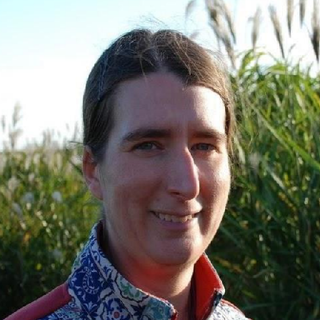 Dr. Lindsay Clark is a Research Specialist in Life Sciences at HPCBio at the Roy J. Carver Biotechnology Center at the University of Illinois, Urbana-Champaign, where she performs bioinformatics analysis, consultation, and training. She is the author of the R package polysat, for population genetic analysis of microsatellite data in polyploid organisms, and the R package polyRAD, for genotype calling from sequencing data in polyploid organisms. She earned her Ph.D. in Genetics from the University of California, Davis in 2011, studying the ecological genetics of invasive blackberry. From 2011-2019 she performed research in population genetics and breeding of Miscanthus in the Department of Crop Sciences at the University of Illinois, Urbana- Champaign.She will present a talk entitled polyRAD: Bayesian genotype calling in polyploids from next-generation sequencing data. polyRAD is an R package that uses sequence read depth and population information to estimate genotype posterior probabilities. It differs from similar software in that it can use population structure and linkage disequilibrium to inform genotype calling, and that it can deal with markers at the RAD-tag level or at the SNP level. It also includes a variant calling pipeline for allopolyploids and other species with recent genome duplications. polyRAD GitHub site: https://github.com/lvclark/polyRAD Main tutorial: https://github.com/lvclark/polyRAD/blob/main/vignettes/polyRADtutorial.md
Dr. Lindsay Clark is a Research Specialist in Life Sciences at HPCBio at the Roy J. Carver Biotechnology Center at the University of Illinois, Urbana-Champaign, where she performs bioinformatics analysis, consultation, and training. She is the author of the R package polysat, for population genetic analysis of microsatellite data in polyploid organisms, and the R package polyRAD, for genotype calling from sequencing data in polyploid organisms. She earned her Ph.D. in Genetics from the University of California, Davis in 2011, studying the ecological genetics of invasive blackberry. From 2011-2019 she performed research in population genetics and breeding of Miscanthus in the Department of Crop Sciences at the University of Illinois, Urbana- Champaign.She will present a talk entitled polyRAD: Bayesian genotype calling in polyploids from next-generation sequencing data. polyRAD is an R package that uses sequence read depth and population information to estimate genotype posterior probabilities. It differs from similar software in that it can use population structure and linkage disequilibrium to inform genotype calling, and that it can deal with markers at the RAD-tag level or at the SNP level. It also includes a variant calling pipeline for allopolyploids and other species with recent genome duplications. polyRAD GitHub site: https://github.com/lvclark/polyRAD Main tutorial: https://github.com/lvclark/polyRAD/blob/main/vignettes/polyRADtutorial.md Originally with a background in physics and pure mathematics (UCC Cork, Ireland), Dr. Peter Bourke has also trained in horticulture and permaculture design. He worked for over four years in vegetable seed production and genetic resource conservation with the Irish Seed Savers Association, Ireland. Peter gained a Master of Science degree in Plant Sciences from Wageningen University & Research in the Netherlands and continued with doctoral research into polyploid quantitative genetics and mapping under the guidance of Prof. Dr. Richard G.F. Visser, Dr. Chris Maliepaard, and Dr. Roeland E. Voorrips. He graduated in 2018 and now works as a researcher and lecturer in the Plant Breeding group in Wageningen. In the workshop, he will be discussing linkage map construction (doi.org/10.1111/tpj.13496) and QTL mapping (doi.org/10.1007/s00122-018-3132-4) in a tetraploid rose population.
Originally with a background in physics and pure mathematics (UCC Cork, Ireland), Dr. Peter Bourke has also trained in horticulture and permaculture design. He worked for over four years in vegetable seed production and genetic resource conservation with the Irish Seed Savers Association, Ireland. Peter gained a Master of Science degree in Plant Sciences from Wageningen University & Research in the Netherlands and continued with doctoral research into polyploid quantitative genetics and mapping under the guidance of Prof. Dr. Richard G.F. Visser, Dr. Chris Maliepaard, and Dr. Roeland E. Voorrips. He graduated in 2018 and now works as a researcher and lecturer in the Plant Breeding group in Wageningen. In the workshop, he will be discussing linkage map construction (doi.org/10.1111/tpj.13496) and QTL mapping (doi.org/10.1007/s00122-018-3132-4) in a tetraploid rose population. Chaozhi Zheng is a researcher at the Biometris group at the Wageningen University and Research. Zheng obtained his Ph.D. in statistical ecology from the University of Helsinki in 2009. He was a postdoctoral researcher in statistical genetics at the University of Washington, Seattle from 2010 to 2012. He nurtures a keen interest in developing statistical and computational methods for genomic data analysis. At the Biometris group since 2013, he has been working on the methodological development for genetic analysis in diploid and polyploid multiparental populations.
Chaozhi Zheng is a researcher at the Biometris group at the Wageningen University and Research. Zheng obtained his Ph.D. in statistical ecology from the University of Helsinki in 2009. He was a postdoctoral researcher in statistical genetics at the University of Washington, Seattle from 2010 to 2012. He nurtures a keen interest in developing statistical and computational methods for genomic data analysis. At the Biometris group since 2013, he has been working on the methodological development for genetic analysis in diploid and polyploid multiparental populations.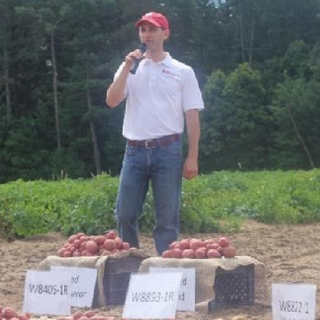 Jeffrey Endelman is an Associate Professor at the University of Wisconsin–Madison and leads the University potato breeding program. He is a co-developer of 16 potato varieties and several software packages for genomics-assisted breeding, including rrBLUP, GWASpoly, polyBreedR, and diaQTL. Endelman has co-authored 35 publications and served on the graduate thesis committees of 26 students. He is a member of the editorial boards for Genetics, Theoretical and Applied Genetics, and The Plant Genome.
Jeffrey Endelman is an Associate Professor at the University of Wisconsin–Madison and leads the University potato breeding program. He is a co-developer of 16 potato varieties and several software packages for genomics-assisted breeding, including rrBLUP, GWASpoly, polyBreedR, and diaQTL. Endelman has co-authored 35 publications and served on the graduate thesis committees of 26 students. He is a member of the editorial boards for Genetics, Theoretical and Applied Genetics, and The Plant Genome.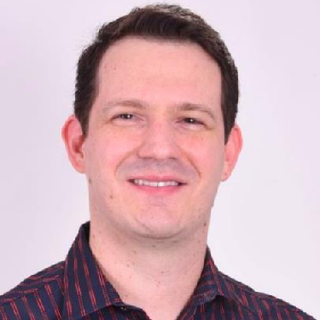 Guilherme da Silva Pereira (Gui) is a biologist with a Ph.D. in Genetics and Plant Breeding from the University of São Paulo and has been working with genetic analysis of polyploid species for almost ten years. Currently, he works as a molecular breeder at the International Potato Center (CIP-Kenya). Gui and his team led by Prof. Zhao-Bang Zeng from North Carolina State University developed the QTLpoly package as part of the Genomic Tools for Sweetpotato (GT4SP) project. The QTLpoly (https://github.com/guilherme- pereira/QTLpoly) allows the detection of multiple quantitative trait loci (QTL) by means of random-effect models. His presentation will cover the basis and interpretation of multiple QTL mapping in autopolyploid full-sib populations. Script examples will be presented for both simulated and real datasets, following the integrated map generated by MAPpoly.
Guilherme da Silva Pereira (Gui) is a biologist with a Ph.D. in Genetics and Plant Breeding from the University of São Paulo and has been working with genetic analysis of polyploid species for almost ten years. Currently, he works as a molecular breeder at the International Potato Center (CIP-Kenya). Gui and his team led by Prof. Zhao-Bang Zeng from North Carolina State University developed the QTLpoly package as part of the Genomic Tools for Sweetpotato (GT4SP) project. The QTLpoly (https://github.com/guilherme- pereira/QTLpoly) allows the detection of multiple quantitative trait loci (QTL) by means of random-effect models. His presentation will cover the basis and interpretation of multiple QTL mapping in autopolyploid full-sib populations. Script examples will be presented for both simulated and real datasets, following the integrated map generated by MAPpoly. Dr. Chris Maliepaard joined Wageningen University – Plant Breeding in 2007. He is currently associate professor and research group leader of a group working on ‘Quantitative Aspects of Plant Breeding’. He carries out research projects about mapping, QTL analysis and marker-assisted selection, mostly related to polyploid crops; other research focuses on prediction of phenotypic traits from ~omics data sets. His line of expertise is on plant breeding, quantitative genetics, statistics and quantitative analysis aspects of systems biology and bioinformatics. He teaches about these topics in several MSc, PhD and international courses. In an earlier phase in his career, Chris was employed at the quantitative genetics and statistics group at Biometris, Wageningen, working on statistical analysis of large data sets, and he did consultancy of breeding companies on statistical and quantitative genetics topics. In his introduction on QTL analysis, he will introduce concepts and methods for QTL analysis and the specific aspects of QTL analysis in polyploid crops.
Dr. Chris Maliepaard joined Wageningen University – Plant Breeding in 2007. He is currently associate professor and research group leader of a group working on ‘Quantitative Aspects of Plant Breeding’. He carries out research projects about mapping, QTL analysis and marker-assisted selection, mostly related to polyploid crops; other research focuses on prediction of phenotypic traits from ~omics data sets. His line of expertise is on plant breeding, quantitative genetics, statistics and quantitative analysis aspects of systems biology and bioinformatics. He teaches about these topics in several MSc, PhD and international courses. In an earlier phase in his career, Chris was employed at the quantitative genetics and statistics group at Biometris, Wageningen, working on statistical analysis of large data sets, and he did consultancy of breeding companies on statistical and quantitative genetics topics. In his introduction on QTL analysis, he will introduce concepts and methods for QTL analysis and the specific aspects of QTL analysis in polyploid crops.Presenter Information: Computational Support
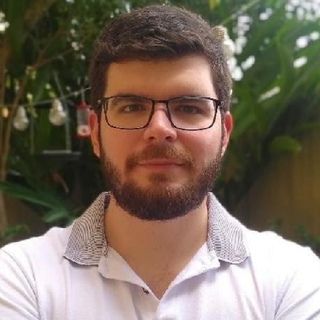 Gabriel Gasteira is a Ph.D. candidate in Plant Breeding and Genetics at the “Luiz de Queiroz” College of Agriculture, University of São Paulo (ESALQ/USP). His current work focuses on the development of computational tools and their application to linkage and QTL mapping in Panicum maximum, an autotetraploid species. His interests involve polyploidy, plant breeding, quantitative genetics, statistical genetics, and programming. He will be helping attendees at the Virtual Project Meeting and Training Workshop through the R Bootcamp and the SCRI Polyploid Computing Support Group. Gabriel will be presenting an introductory session during the Computational Support session which will cover the following topics: R setup/installation; installation of additional packages; understanding the R environment; exploring object structures; dataset manipulation; exploratory analysis; generating graphics; common issues and troubleshooting.
Gabriel Gasteira is a Ph.D. candidate in Plant Breeding and Genetics at the “Luiz de Queiroz” College of Agriculture, University of São Paulo (ESALQ/USP). His current work focuses on the development of computational tools and their application to linkage and QTL mapping in Panicum maximum, an autotetraploid species. His interests involve polyploidy, plant breeding, quantitative genetics, statistical genetics, and programming. He will be helping attendees at the Virtual Project Meeting and Training Workshop through the R Bootcamp and the SCRI Polyploid Computing Support Group. Gabriel will be presenting an introductory session during the Computational Support session which will cover the following topics: R setup/installation; installation of additional packages; understanding the R environment; exploring object structures; dataset manipulation; exploratory analysis; generating graphics; common issues and troubleshooting.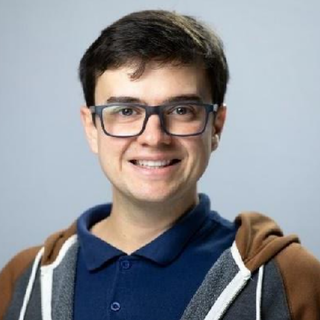 Filipe Matias is a post-doctoral research scientist at the University of Wisconsin-Madison (Jeffrey Endelman's lab). Interests in quantitative genetics, genomic selection, genomic association of polyploid species, and high-throughput phenotyping. Matias will be helping attendees with the SCRI Polyploid Computing Support Group.
Filipe Matias is a post-doctoral research scientist at the University of Wisconsin-Madison (Jeffrey Endelman's lab). Interests in quantitative genetics, genomic selection, genomic association of polyploid species, and high-throughput phenotyping. Matias will be helping attendees with the SCRI Polyploid Computing Support Group. Jeekin Lau is a Ph.D. candidate at Texas A&M University. He currently works on utilizing and comparing available genetic tools for the genetic analysis and QTL discovery for disease resistance, flower productivity, and plant architecture of tetraploid roses. He has experience using tetraploid SNP-array based genotyping, genotype calling, linkage mapping, and QTL mapping for disease and horticultural traits. Jeekin will be helping attendees with the SCRI Polyploid Computing Support Group.
Jeekin Lau is a Ph.D. candidate at Texas A&M University. He currently works on utilizing and comparing available genetic tools for the genetic analysis and QTL discovery for disease resistance, flower productivity, and plant architecture of tetraploid roses. He has experience using tetraploid SNP-array based genotyping, genotype calling, linkage mapping, and QTL mapping for disease and horticultural traits. Jeekin will be helping attendees with the SCRI Polyploid Computing Support Group.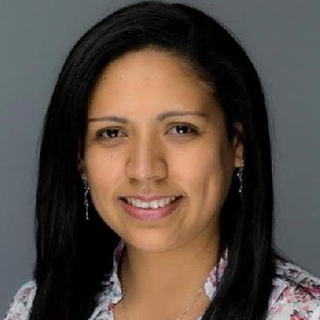 Maria Caraza-Harter is a post-doctoral research associate at the University of Wisconsin-Madison in the Endelman Lab. She earned a Ph.D. degree in Plant Breeding and Plant Genetics at UW-Madison studying the genetics of skin set and color in red potatoes. Her main interests are in quantitative genetics and genomic association for quality traits in tetraploid potatoes. Maria will be helping attendees at the Training Workshop for the Tools for Genomics-Assisted Breeding in Polyploids project.
Maria Caraza-Harter is a post-doctoral research associate at the University of Wisconsin-Madison in the Endelman Lab. She earned a Ph.D. degree in Plant Breeding and Plant Genetics at UW-Madison studying the genetics of skin set and color in red potatoes. Her main interests are in quantitative genetics and genomic association for quality traits in tetraploid potatoes. Maria will be helping attendees at the Training Workshop for the Tools for Genomics-Assisted Breeding in Polyploids project.R Tutorials:
Learning R in R: https://swirlstats.com/
R Introduction: https://sbc.shef.ac.uk/training/r-introduction-2019-03-29/
Data Manipulation and Visualization in R: https://sbc.shef.ac.uk/training/r-introduction-2019-03- 29/
R for Data Science: https://r4ds.had.co.nz/
Learning R in R: https://swirlstats.com/
R Introduction: https://sbc.shef.ac.uk/training/r-introduction-2019-03-29/
Data Manipulation and Visualization in R: https://sbc.shef.ac.uk/training/r-introduction-2019-03- 29/
R for Data Science: https://r4ds.had.co.nz/
Environments:
R: https://cran.r-project.org/
RStudio (recommended IDE): https://rstudio.com/products/rstudio/download/
Julia (necessary for PolyOrigin): https://julialang.org/
Python 2.7 (necessary for SuperMASSA): https://www.python.org/downloads/release/python 2718/
https://ropenscilabs.github.io/r-docker-tutorial/02-Launching-Docker.html
Genotype Calling:
SuperMASSA: https://bitbucket.org/orserang/supermassa/src/master/
VCF2SM: https://github.com/guilherme-pereira/vcf2sm
polyRAD: https://github.com/lvclark/polyRAD
fitPoly: https://cran.r-project.org/web/packages/fitPoly/index.html
Linkage Mapping and Haplotype Reconstruction:
MAPpoly: https://cran.r-project.org/web/packages/mappoly/index.html
polymapR: https://cran.r-project.org/web/packages/polymapR/index.html
PolyOrigin: https://github.com/chaozhi/PolyOrigin.jl
QTL Mapping:
QTLpoly: https://github.com/guilherme-pereira/QTLpoly
polyqtlR: https://cran.r-project.org/web/packages/polyqtlR/index.html
diaQTL: https://github.com/jendelman/diaQTL
GWASpoly: https://github.com/jendelman/GWASpoly
R: https://cran.r-project.org/
RStudio (recommended IDE): https://rstudio.com/products/rstudio/download/
Julia (necessary for PolyOrigin): https://julialang.org/
Python 2.7 (necessary for SuperMASSA): https://www.python.org/downloads/release/python 2718/
https://ropenscilabs.github.io/r-docker-tutorial/02-Launching-Docker.html
Genotype Calling:
SuperMASSA: https://bitbucket.org/orserang/supermassa/src/master/
VCF2SM: https://github.com/guilherme-pereira/vcf2sm
polyRAD: https://github.com/lvclark/polyRAD
fitPoly: https://cran.r-project.org/web/packages/fitPoly/index.html
Linkage Mapping and Haplotype Reconstruction:
MAPpoly: https://cran.r-project.org/web/packages/mappoly/index.html
polymapR: https://cran.r-project.org/web/packages/polymapR/index.html
PolyOrigin: https://github.com/chaozhi/PolyOrigin.jl
QTL Mapping:
QTLpoly: https://github.com/guilherme-pereira/QTLpoly
polyqtlR: https://cran.r-project.org/web/packages/polyqtlR/index.html
diaQTL: https://github.com/jendelman/diaQTL
GWASpoly: https://github.com/jendelman/GWASpoly
